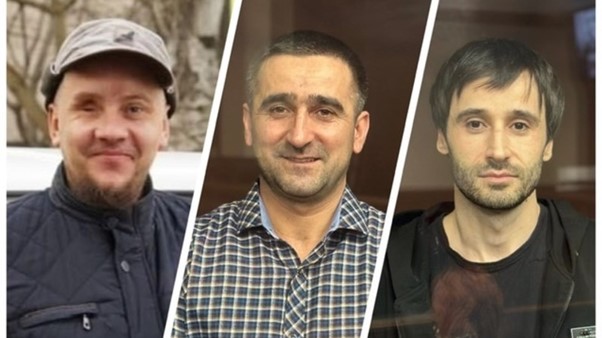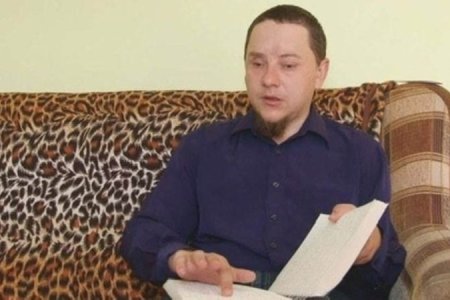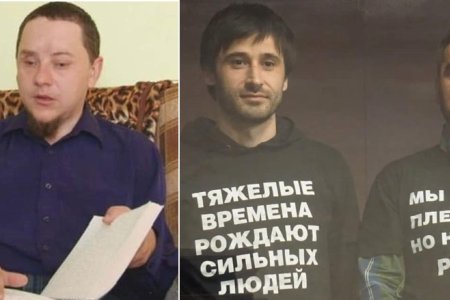
A Russian prosecutor has asked for an incredible 18-year sentence against Oleksandr Sizikov although the Ukrainian is blind and moves about with difficulty. Prosecutor Sergei Aidinov claimed that such a sentence was justified, although the ‘evidence’ against Sizikov for charges of ‘terrorism’ included books of ‘prohibited’ religious literature, planted by the FSB, which Sizikov could not read as they are not in Braille.
Oleksandr Sizikov was one of seven Crimeans arrested on 7 July 2020, with two Crimean Tatars – Seiran Khairedinov and Alim Sufianov – subsequently charged in the same ‘case’ with him. Aidinov is seeking 14-year sentences against Khairedinov and Sufianov on essentially the same charges. The three men are not accused of any actual crime, merely of unproven involvement in a peaceful organization which is legal in Ukraine and most countries. Russia’s Supreme Court declared Hizb ut-Tahrir, a Muslim transnational organization, ‘terrorist’ in 2003, with the ruling passed in secret and only made public after it was too late for the organization itself, and human rights groups, to challenge it. The Russian FSB began arresting Ukrainian citizens on these charges soon after its invasion and annexation of Crimea, and is particularly using them as a weapon against Crimean Tatar civic activists and journalists.
In all such ‘trials’, the FSB needs at least one person to face the more serious charge of ‘organizing’ a supposed Hizb ut-Tahrir group (Article 205.5 § 1 of Russia’s criminal code which is illegally applied in occupied Crimea). The others are charged with ‘involvement’ in this alleged group (under Article 205.5 § 2). The difference is often arbitrary, although there have been cases where people have been designated ‘organizer’ as a method of reprisal (since the sentence is much larger). Here, Sizikov, who needs help to move around, is claimed to have ‘organized’ a group with Khairedinov and Sufianov – members. All three men are also charged, under Article 278, with ‘planning to violently seize power’. Although this seems especially grotesque in view of Sizikov’s physical disability, it is an absurd, but standard part of the FSB’s arsenal in all of these cases. In a recent ‘trial’, the prosecution ‘justified’ the charge by claiming that the men had been planning a state coup via ‘“the total Islamization of the population”. In this case, the prosecution claims that the three men tried, as purported members of Hizb ut-Tahrir , to sow division in society “through militant Islamic propaganda”.
Sizikov is supposed to have been the organizer of a group which purportedly “carried out covert anti-constitutional activities through exerting influence on people’s religious feelings; organized and carried out meetings of the group, so-called ‘khalakaty’; looked for new participants and circulated the ideas”.
Prosecutor Aidinov claimed that Sizikov’s laptop contained programs which he was able to use through the use of his voice. In fact, Sizikov could only use them when helped by others. He has stated that he was ‘helped’ in using the laptop by Konstantin Tumarevich. This individual is believed to have acted as so-called ‘secret’ or ‘anonymous witness’ in Russia’s prosecution of a huge number of Crimean Tatar or other Ukrainian Muslim political prisoners from Bakhchysarai. Tumarevich is a fugitive from justice in his native Latvia, and his vulnerable legal position in occupied Crimea and lack of documents provided the FSB with clear leverage against him. He has thus far been used to provide ‘anonymous witness’ testimony against at least 20 recognized political prisoners. In each such ‘trial’, the ‘judges’ ignore the fact that there are no grounds for secrecy, and every reason to conclude that it is the FSB Tumarevich would need to fear, if he refused to collaborate, not the political prisoners or their families. In general, the presiding ‘judge’ in these cases blocks questions from the defence which demonstrate that the so-called ‘witness’ is lying.
In this ‘trial’, as in many others, the charges and FSB surveillance date back to 2015 when Tumarevich was actively and freely using Sizikov’s computer, and when Sizikov had no way of monitoring what the Latvian was doing. Sizikov was hit by a car while cycling back in 2009 and was left both blinded, and unable to move without assistance
In none of these ‘trials’ is there any real evidence of involvement in Hizb ut-Tahrir, with the FSB using planted ‘prohibited’ literature; fake anonymous witnesses and FSB-loyal ‘experts’ willing to interpret religious or political discussions as demanded by the prosecution.
The families of Khairedinov and Sufianov stated from the outset that the armed and masked men who burst into their homes on 7 July 2020, and prevented lawyers being present during their ‘searches’, had planted ‘prohibited books’. It later became clear that they had done so in Sizikov’s case as well, although they left books that he was physically unable to read.
This is most unlikely to be taken into account by the panel of ‘judges’ at the Southern District Military Court in Rostov, although presiding ‘judge’ Roman Supronov did agree, in August 2021, to order the case material to be translated into Braille so that Sizikov could, at least, know what he was charged with. That decision was, however, later overturned by the Military Court of Appeal in Vlasikha (Moscow region).
The prosecution is claiming that Sizikov, Khairedinov and Sufianov were members of Hizb ut-Tahrir and tried to sow division in society “through militant Islamic propaganda”. Sizikov is supposed to have been the organizer of a group which purportedly “carried out covert anti-constitutional activities through exerting influence on people’s religious feelings; organized and carried out meetings of the group, so-called ‘khalakaty’; looked for new participants and circulated the ideas”.
It should be stressed that nothing in the above, even were it true, would fit into any definition, even that of Russia’s criminal code, of ‘terrorism’. It is telling also, that until 2016, Russia was the only country in the world to have labelled Hizb ut-Tahrir ‘terrorist’. It was joined in 2016 by Uzbekistan, a country notorious for its religious persecution of, among others, members of Hizb ut-Tahrir.
This was one of only two cases where a Russian-controlled ‘court’ has taken a political prisoner’s condition into account. It remanded both Seiran Khairedinov and Alim Sufianov in custody, with them remaining imprisoned to this day, but placed Oleksandr Sizikov under house arrest. Since then, Russian prosecutors (Sergei Aidinov and Vladislav Kuznetsov have made repeated attempts to get Sizikov also placed in a remand prison [SIZO], and Aidinov has now demanded that Sizikov be imprisoned in harsh-regime prison colonies for 18 years, with the first five years in the worst of Russia’s penitentiary institutions.
There has, unfortunately, been nothing so far in this ‘trial’ to expect any justice for the three political prisoners. The next hearing, one of the last, has been scheduled for 1 February despite the fact that two of the men’s lawyers clearly stated that they are busy in other trials and will be unable to attend.


